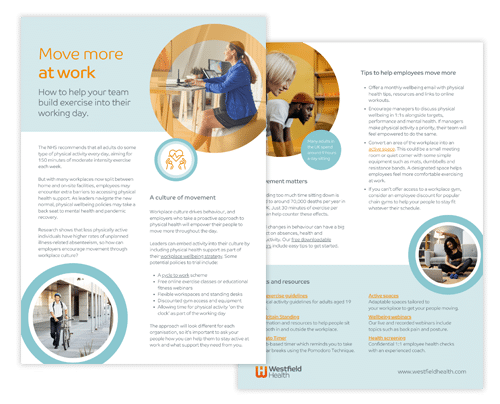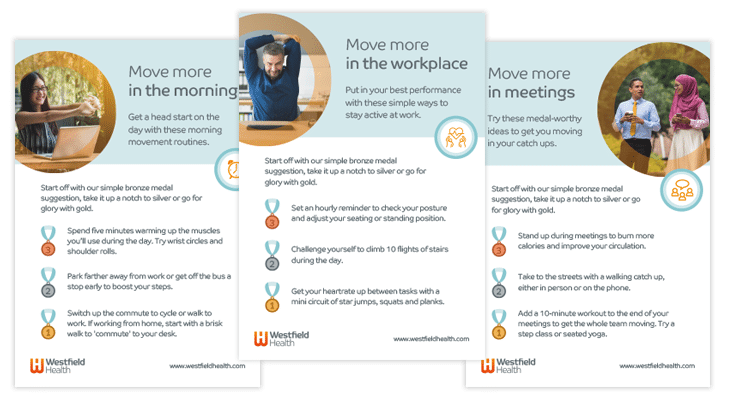Both mental and physical health absences have a huge impact on the workforce, with employees taking an average of ten days off per year between the two. Mental and physical health support might appear to be separate challenges, but research consistently shows that physical activity is the number one intervention for improving mental health1.
Moving more at work doesn’t require specialist equipment - just willing role models in leadership and an inclusive, supportive and flexible culture that recognises movement in all its forms.
How many sick days do workers take each year?
Mental health absences
Our yearly Workplace Wellbeing Survey found that almost two-fifths (38%) of people took at least one day off work due to poor mental health in 2023.
Physical health absences
Almost 6 in 10 people took time off for physical health issues, such as the flu or MSK conditions.
Mental health
4.7
days off per employee in 2023.
Physical health
5.1
days off per employee in 2023.
The hidden cost of mental health absences
10%
of people took more than 10 days mental health days off in 2023. That’s 1 in 10 workers experiencing long-term poor mental health.
45%
say their mental health impacted their productivity in the last 12 months — an unseen challenge affecting almost half the workforce.
£19.5bn
Total cost of mental health days off to UK businesses in 2023.
Building movement into your wellbeing strategy
Over a third (37%) of workers sought mental health advice in 2023, but with NHS demand at an all-time high2, workplaces play a vital role in preventative support.
Organisations often frame mental health as a standalone priority, but the support you offer should account for the symbiotic relationship between mental and physical wellbeing.
In practical terms, this means placing movement at the heart of your wellbeing strategy.
Where did you seek mental health support?
0%
5%
10%
15%
20%
Our recommended solutions
Consultancy - People
A successful wellbeing strategy is essential for creating a healthy, engaged, and high-performing workforce
Find out moreWebinars, workshops and training
Help your employees feel more engaged and productive at work
Find out moreHow does physical health affect mental health?
Regular physical activity not only improves cognitive function, concentration and overall mood, but is also a tool to combat the effects of low mood and anxiety.
When experiencing symptoms of poor mental health, intense exercise may not be possible. Instead, light activity — such as short walks or yoga — has been shown to boost the immune system, improve mood and combat the symptoms of anxiety and depression3.
Fitting exercise into workplace routines
Physically active people have up to a 30% reduced risk of becoming depressed. Fitting exercise into our routine can improve mood, self-esteem and confidence levels.
Physical activity improves the sleep cycle
Good sleep is crucial for our mental health. Sleep and mental health influence each other in over 75% of cases, with poor sleep leading to fatigue, stress and low mood.
A natural source of stress release
Being physically active readies our brains to cope with anxiety and stress more effectively and helps combat the symptoms of poor mental health.
Having a good level of physical fitness has a lot of mental health benefits. Exercise increases blood flow to the muscles which also increases flow to the brain. It releases hormones which help to decrease stress, make you more alert and help your mind to function at its best.
Help your people move more
Physical health conditions have a direct impact on mental health, with 45% of people with poor mental health also having a long-term physical health condition. Low energy, physical pain and sleep disruption are symptoms that overlap with — or even cause — poor mental health.
Physical activity helps to regulate stress, improve mood and flexibility. You don’t need to run marathons to be more active, and businesses can help their people to move more throughout the day. Regular breaks, walking meetings and desk-based stretches are all great starting points.
Download our free resources on moving more for more information on how to build physical activity into your workplace routine.
Sources
1 Singh B, Olds T, Curtis R, et al. Effectiveness of physical activity interventions for improving depression, anxiety and distress: an overview of systematic reviews. British Journal of Sports Medicine 2023;57:1203-1209. bjsm.bmj.com/content/57/18/1203
2 NHS Monthly operational statistics - January 2024. www.england.nhs.uk/long-read/monthly-operational-statistics-january-2024/
3 Mahindru A, Patil P, Agrawal V. Role of Physical Activity on Mental Health and Well-Being: A Review. Cureus. 2023 Jan 7;15(1):e33475. doi: 10.7759/cureus.33475. PMID: 36756008; PMCID: PMC9902068. www.ncbi.nlm.nih.gov/pmc/articles/PMC9902068/

